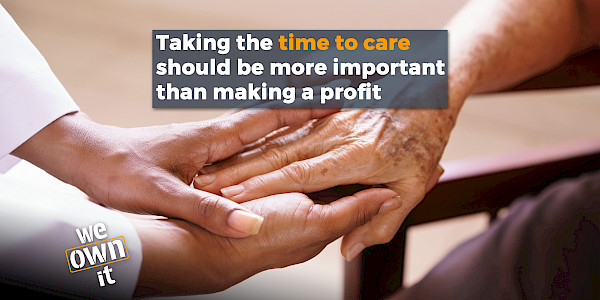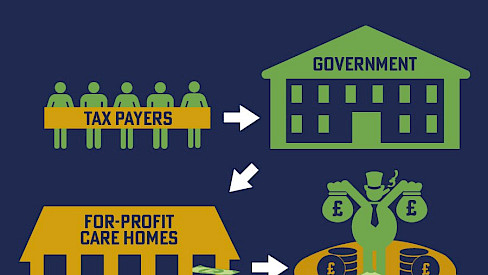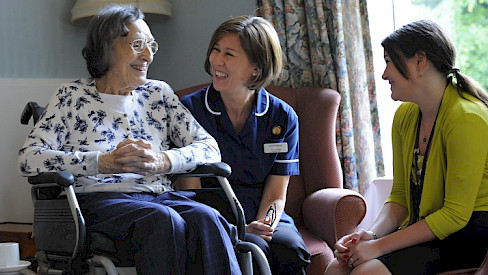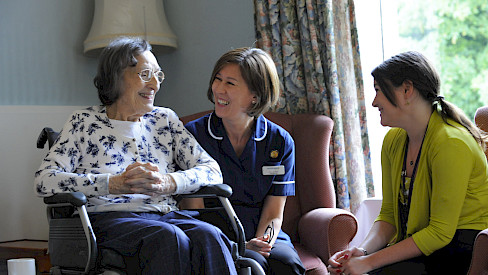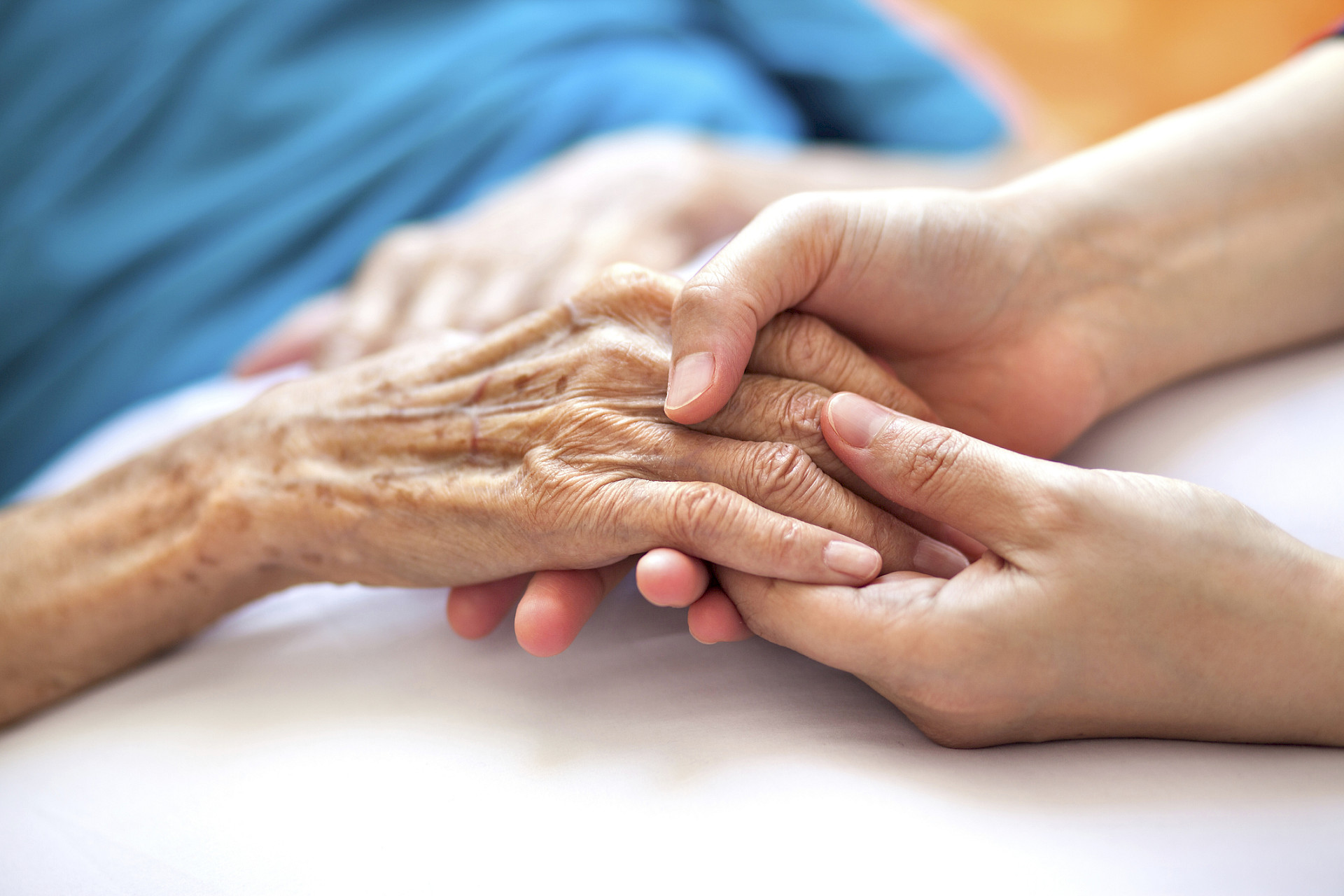
Privatisation of care services has damaged people’s lives. Care is a public service run for profit by a chaotic mixture of providers. Care homes are seen as an investment opportunity – paid for by you directly, often by selling your home if you have one, or by cash strapped local authorities.
Caring for people in their own homes is a hugely important job that is too often undervalued. Looking after older people, helping them wash and dress, cleaning and tidying, giving them medicine, preparing their meals, keeping them company - you might be the only person they see all day.
Key facts
- 64% of the public want care homes to be run in public ownership.
- Quality in care homes in England is poor, with one in every five homes rated ‘inadequate’ or ‘needing improvement’. Larger care homes are associated with a worse quality of care.
- The Scottish TUC has found that nearly 25% of care homes run by big providers had at least one complaint upheld against them in 2019/20, compared to 16% in the rest of the private sector and 6% in homes not run for profit. Staffing resources are also 20% worse in the private sector.
- 10% of funding leaks out of the system through hidden profit extraction (an estimated £1.5 billion out of a total of £15 billion funding). This money leaks out through complicated corporate structures into dividend payments, rent, interest, management and directors fees.
- The 26 big providers who account for 30% of all beds leak out £13.35 of every £100.
- At least 40,000 people a year have to sell their homes to pay for nursing care. Around half of social care funding is provided by local authorities and the NHS, around half from individuals and their families.
- From 2010 to 2017/18, government funding of local authorities has fallen by 49% in real terms. Councils are now spending 38% of their total budget on social care.
- Private care workers are under pressure and under valued. Skills for Care says that the vacancy rate is consistently over 6% and turnover at 29%. 82% of the workforce are female and 21% are Black, Asian or minority ethnicity.
- By 2040, nearly one in seven people will be over 75. What kind of future do we want for care work?
The history
When the National Health Service was set up in 1948, a National Assistance Act 1948 was also passed, setting out responsibilities for local authorities to provide residential accommodation for older people in need, and other services like home helps, day centres, meals-on-wheels, lunch clubs and drop-in centres.
During the 1980s and 1990s, local authority care homes were transferred to the private sector and home care agencies entered the market, replacing local authority services. The NHS and Community Care Act 1990 took away local authorities’ responsibilities to provide care directly. Instead, they had the duty of buying care, mostly from private profit-making businesses. In 1980 there had been 37,400 places in private residential care homes (a small proportion of the total) but by 1990 the number of private places had increased to 155,600.
The Care Standards Act 2000 led to the creation of the Care Quality Commission and the Care Act 2014 put local authorities in charge of shaping the market. Local authorities are responsible for the welfare of residents, and the NHS picks up the pieces when things go wrong – while the private providers prioritise their shareholders.
“There’s only one winner isn’t there, and that’s the investment companies.” Tess, Staffordshire - BBC’s Panorama ‘Crisis in Care: Follow the Money’)
Who owns our care services?
In 1960, the private sector provided 10.5% of residential care, while the public sector provided 66% (and the voluntary sector 23%). Today private provision is at 83%, the voluntary sector at 13% and the public sector just 4%.
Nearly a third of care home beds are owned by the 26 largest companies, whose investors see them as a source of income and profit. Three of the biggest groups – Four Seasons, Care UK and HC-One – are or have been owned by private equity firms. They have 39,000 beds between them. The BBC's Panorama ‘Crisis in Care: Follow the Money found that 20% of the fees paid to HC-One go towards paying for the company's profit and paying off its debt. Meanwhile, residents of its care homes receive terrible care and their families suffer.
These companies disguise their profits using incredibly complicated corporate. 18 of the 26 largest for profit providers have split their operating company which runs homes from the property company which owns them – this limits their responsibility if they cause harm and makes it easier to avoid tax. 6 of them have owners based in a tax haven.
The care home ‘market’ where private equity backed providers gamble on care homes is unsustainable. Since 2011, two major care home providers, Southern Cross and Four Seasons, who between them provided care to 45,000 residents, have either left the industry or gone into administration.
Why care must work for people not profit
Caring for people properly is about having a civilised society where everyone is treated with dignity. The Audit Commission said in 2018 that “social care cannot continue as a Cinderella service”.
We need to reverse privatisation - reduce the role of the private sector and increase the role of local authorities and the not for profit sector. Care homes belong in public ownership. The Centre for Health and the Public Interest recommends that the government use capital to build new care homes – these could built by local authorities and the NHS. Councils can employ care workers directly and make sure they are well trained with decent terms and conditions, building on the work UNISON has done with the Ethical Care Charter.
The Labour Party wants to bring in a National Care Service in England and is holding a review to see how this could be done. Shadow Health Secretary Wes Streeting says “I would love to see a national care service delivered exactly on the same terms as the NHS, publicly owned, publicly funded, free at the point of use, but we’ve got to be honest about the scale of the challenge. So our starting point is to make sure we deliver national standards for care users and better pay and conditions for staff who work in social care.”
Scotland has already committed to introducing a National Care Service but has said it won't be run by the state. The Scottish TUC, however, has found that 'Scotland can't afford privatised social care'. It says that "large private providers are associated with lower wages, more complaints about care quality and higher levels of rent extraction than public and third sector care providers".
Latest related We Own It news
-
5 Jul 2022 Source: We Own It
-
-
Why we need a publicly owned care service
- Care Work
- Privatisation (general)
30 Jul 2019 Source: We Own It

